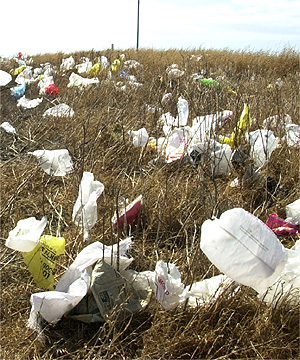Local changes, simple ones like this, should be rapidly implemented. There is a high ecological costs to producing and using plastic bags. We know it. We see them littering our neighborhoods. When will we stop?
If we don't, what does it say about our true commitment to change?

October 22, 2012 By FRANK CARINI
Fifteen years ago Pakistan banned the use of plastic bags. Earlier this month, the Barrington Town Council, after much debate and plenty of consternation, passed a ban that expires in two years.
The sixth-most populous country in the world, consisting of four provinces and four federal territories, and whose recent history can be characterized by periods of military rule and political instability, has no need for plastic grocery bags. But a small town of about 17,000 is addicted to these pouches of petroleum. Concerned Town Council members believe they need to wean their bag-dependent constituents from their plastic habit.
Pakistan’s government determined — likely quite easily — that discarded plastic bags were choking storm drains, spoiling the countryside and causing environmental problems. Barrington officials are more concerned that a local shopper could be left holding a reusable cloth bag.
At an August council meeting, the American Progressive Plastic Bag Alliance, a plastics industry advocacy group, sent a representative from Washington, D.C., to speak against the ban. His pants-on-fire line that “Given a choice, plastic bags are an environmentally friendly choice” must have resonated with town officials.
By giving the bag ban a two-year sunset provision, the afraid-to-get-yelled-at-by-small-government-big-mouths Town Council provided opponents with a targeted deadline for reversing the limp measure. While most residents at the Oct. 1 meeting where the wimpy law was passed expressed support for a full ban, the Town Council was more interested in pacifying a few people who 40 years ago would have belly-ached about the government mandate to ban DDT.
Lobbyists from the American Chemistry Council will not doubt be appearing in Barrington in summer 2014.
In the midst of the council’s months-long dizzying bag ban debate, Shaw’s, the town’s largest retailer, announced it was voluntarily pulling plastic checkout bags from its store by the end of November.
While Westport, Conn., hasn’t had a compliant or violation in its four years with a bag ban, one or two complaints will likely allow the Barrington Town Council to simply do nothing to reinstate the bag ban, as loudmouth opponents portray such an extension as politically risky.
Unfortunately, Barrington isn’t the only U.S. town, city or state afraid to ban what is routinely used to carry a tube of toothpaste from the checkout line to a parked SUV. Five months ago, Hawaii became the first — and still only — state to ban plastic checkout bags.
Since 2009, though, eight states have passed laws that permit guns in bars.
Plastic grocery bags clog storm drains, which intensifies flooding, choke animals and litter beaches. It takes about 400 years for a plastic grocery bag to decompose.
Yet an estimated 500 billion to 1 trillion plastic bags are used worldwide annually, including 380 billion in the United States alone. We carelessly discard some 100 billion of those plastic bags every year, which is the equivalent of dumping nearly 12 million barrels of oil.
Civilization thrived for centuries without plastic vessels to carry fruits and vegetables from market. And, please, banning plastic retail bags won’t ruin the economy or send unemployment soaring. Deregulating Wall Street already accomplished that.
Frank Carini is the editor of ecoRI News.

No comments:
Post a Comment